Did the West ever understand them? via AFP PHOTO/ SHAH Marai

When I think about the West’s project to liberate Afghan women, my mind conjures a line from T.S. Eliot: “The last temptation is the greatest treason/to do the right deed for the wrong reason.” In Afghanistan, we engaged in a twenty-year, deliciously self-righteous, tragically ill-designed mission best expressed by flipping that sentence.
We did the wrong thing, perhaps for the right reason. We wanted to develop that country and rescue Afghan women. Their lives were hellish, girls banned from school, women forbidden to leave their homes except in the company of a male guardian, vigilantes beating them with sticks if their burqa was too short. We wanted them to enjoy the pleasures of modernity and live full, happy lives.
Along with the rest of that failed nation-building venture, we got this part wrong too. And now, instead of recalibrating, we are full speed ahead compounding the harm.
Our mantra now is: “We can’t abandon the Afghan women.” And what we mean by that is visas and evacuations. But obviously, we can’t fly out all Afghan women. As for the others, we’re handing them off to confront a medieval regime all on their own, having skimmed away anyone who is educated, affluent, articulate, connected and savvy. We’re leaving them in poverty and on the brink of famine, after whisking away those who staffed the food programmes and the clinics. The US embassy is shuttered. That, folks, is what abandonment looks like.
The sad secret underlying our Great Afghan Liberation Project is this: when we set out to rescue Afghan women, we had no idea of who, how or why. We worked with those we could readily find and interact with, the urban and urbane, the ones who figured us out and gratified our need for photogenic success. We never got to the ones in the slums and the villages.
Even now, we seem unaware that there is no such entity as “Afghan women”. Yet the circumstances of their lives, their mindsets and the forces to which they are subject, make them as distinct from each other as different species.
So I propose: A Field Guide To Afghan Women.
Let us start with the group that no one ever starts with: the ordinary, average, downtrodden, ignored and unloved women who make up the great majority of their country’s female population. They are Afghanistan’s nightingales, peering out shyly from behind the mud walls of their compounds, shapeless silhouettes in drab clothing, accustomed to being ignored and secluded. And possessed, I believe, of a uniquely beautiful voice, if circumstance would ever allow.
Type One: The Invisible Real Women of Afghanistan
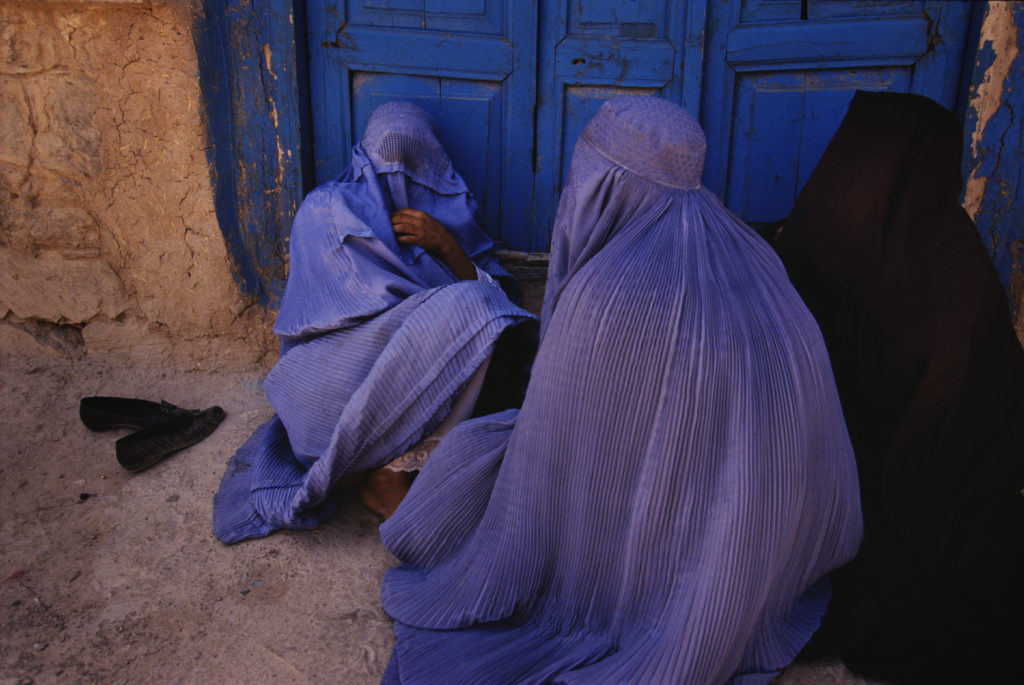
The largest segment of Afghan women are the urban poor, the rural population and the internally displaced living in camps. Their lives have barely changed over the past two centuries — never mind the past twenty years. The Communists tried, launching the only true effort to reform an entrenched system of deeply patriarchal, tribal, feudal oppression. The stakeholders of that system resisted, and in our zeal to beat the Soviets on this proxy battleground, we made sure they prevailed.
The lives of these women are sad and difficult. Their birth is regretted, their mothers scorned or even punished for having failed to produce a son. Their childhood consists of training for servitude, starting with their brothers, who are encouraged to order them about. Too soon, it is time for marriage, often to a relative or to a much older man the family wishes to please. Love is not present to soften the lot of these women, and given the segregated lives that reduce contact between husband and wife to a crude minimum, it has little chance to develop over time. A woman’s standing does not improve until she has adult sons; that gains her the right to lord it over her daughters-in-law, who instead of female solidarity, can expect one more tyrant.
What did America’s two trillion-dollar investment buy for this group of Afghan women, in terms of an improved standard of living? Spoiler alert: not much.
According to UNICEF, half of all deaths of Afghan women between the ages of 15 and 49 were attributable to untreated complications of pregnancy and childbirth — statistics straight out of the Middle Ages. In 2017, Doctors Without Borders declared Afghanistan “one of the most dangerous places on earth to have a baby.” This is the result of 15-plus years of Western projects and funding.
What about everyone’s pet project, education? No public speech about Afghanistan failed to tout this as the great triumph: “3.5 million girls back in school, four-fifths of primary school girls enrolled in class.” Wonderful. Applause. The only problem? It’s not true.
Human Rights Watch in 2017 reported that: “Sixteen years after the US-led military intervention that ousted the Taliban government, an estimated two-thirds of Afghan girls do not go to school.”
These are the things we failed to do. Here is what we did instead:
- We created and coddled a tiny, entitled urban elite of professional feminists who were great on the Western lecture circuit but were disconnected from — and I venture to say, uninterested in — the actual lives of Afghan women, and who rarely used their privileges to benefit their poorer sisters.
- We loved to build girls’ schools. It was fashionable, and we ignored early signs that the mantra “build it and they will come” wasn’t true for Afghanistan. There weren’t enough teachers, and the unending violence made it unsafe to undertake anything but a very short journey. It surely would have been better to build clinics instead, and trained traveling nurses and midwives, and focused on nutrition projects and water projects and basic public education on hygiene and first aid.
- Then came 2021 and suddenly the Taliban were in Kabul, and we reacted with hysteria. A Plan B would have been judicious, a ready visa process in the event of imminent danger to educated people or high-profile activists. Instead, we preemptively grabbed as many male and female professionals as we could possibly shove onto airplanes — all the people with useful talents: doctors and nurses, journalists, women with artisanal skills, teachers, IT experts. Anyone who could have kept civil society, economic relations, social services and moderate values alive was hustled onto a plane and flown as far away as possible. Not an evacuation, more like a reverse cultural revolution that erased in the space of days what we had nourished over two decades.
How did we go so far off the rails? We had a goal: liberation and empowerment. And we had a theory. We had to educate Afghan women, make them economically independent and get them involved in politics.
I first glimpsed the missing piece of that formula in 2002. I was in my office at the RAND Corporation with a pile of reports and statistics about Afghanistan. What jumped out at me was a problem no one seemed to be seriously considering: the basic physical condition of the average Afghan woman.
Almost everywhere in the world, women slightly outnumber men and have a longer life expectancy. This is particularly the case in countries at war, because while the entire population suffers, the fighting is primarily done by men. But in Afghanistan, there was a clear overhang of males.
The reasons were no mystery. Good food and medical care were given first to boys and men. This made girls far more prone to illness and malnourishment, which led to stunted growth and immature bodies. Couple this with child marriage, and you have 12 and 13-year-old girls being impregnated, losing the baby, being berated for their failure and made to try again. Girls and women were dying disproportionately, of neglect, rough treatment, deprivation, withholding of care and physical abuse.
I also remember when I first began to question my deeply hostile attitude towards the Taliban. It was 2018. Russia had hosted a meeting about the peace process, and the Taliban had issued a “Moscow Declaration” explaining their platform. One section addressed the issue of women. As expected, I found the usual prevarication: women would have “all the rights guaranteed to them in Islam”, whatever that would mean in the interpretation of Taliban men.
But then came this:
“Women are faced with a lot of disasters. The so-called women rights activists stayed in Afghanistan for 17 years; in this period billions of dollars came to Afghanistan, but still Afghanistan is at the top of the countries where many women die during delivery due to lack of health facilities. Afghanistan is still among the top countries of the world where the average life expectancy rate of women is only 45. It is among the top countries of the world where there are more than one million widows. Due to corruption, the expenses brought and spent under the title of women rights have gone to the pockets of those who raise slogans of women rights…”
This was surprisingly empathetic. Nor could I disagree. Afghan feminists and their international supporters had not seemed to care about the bulk of the country’s women, had made no real attempt to address their most pressing “disasters”: lack of food, lack of health care and basic physical safety.
Personally, I had long since lost respect for the self-promoting feminists of Kabul, who knew exactly which Western buttons to push but deployed that skill almost exclusively for their own benefit. They loved attending conferences abroad, were expert at obtaining lucrative contracts to “train” each other in such skills as public speaking, leadership and “advocacy,” and enjoyed being celebrated for their “courage” in foreign news media. You wouldn’t find them in the provinces, trying to uplift rural women. And when leadership and their much-vaunted courage were urgently required, they decamped for the West. Like their country’s national army, they were a colossal disappointment.
Afghan Woman Type Two: The Living Success story
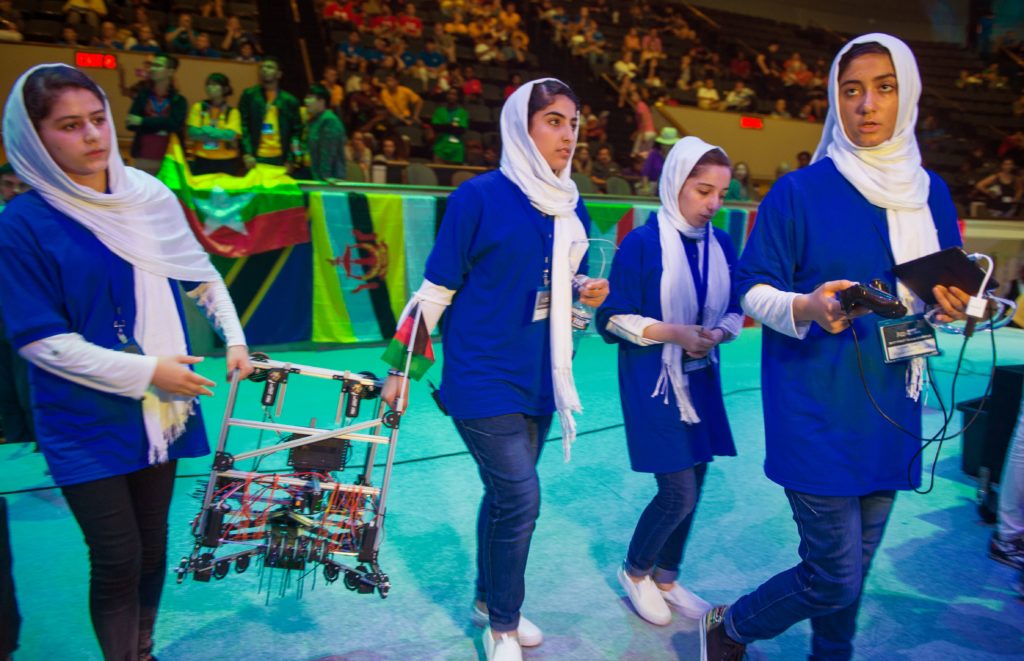
PAUL J. RICHARDS/AFP via Getty Images.
Afghan girls playing soccer. An Afghan woman street artist. An Afghan girls’ robotics team.
What else but extreme condescension explains the delighted surprise with which we received such stories? Why is it so amazing that Afghan girls can learn how to play a musical instrument or kick a ball? Why shouldn’t they be like any other girl in any other country, if given the chance? Given the dire situation of the average Afghan girl, were these really the activities that deserved our attention?
The American University of Afghanistan has an annual budget of 28 million dollars, with which it educates 1700 students, almost all on full scholarships, around half of them girls. The campus is beautiful, the infrastructure state of the art. Surely these students comprehended their great good fortune and were determined to give back to their countrymen and women.
But when the moment of truth arrived, they performed as spokespersons only for themselves. They wanted to be flown to the US — and who can blame them? These are the spoiled children of our bad parenting, the products of an education that taught entitlement over idealism. In the past, groups of them used to be brought to Washington DC and trotted out at gala fundraisers in five-star hotels. At the end of the evening, they’d be brought back on stage to press for additional donations.
To support some programme for the underserved, literacy tutoring for village girls, perhaps? No, they were prompted to ask for money for new sports jerseys, and everyone applauded and got out their check books. Wonderful! Afghan girls shooting hoops.
The adult members of the Living Success Story typically hail from affluent families or clans. Many have dual nationality or family overseas. They are well-travelled and have passports and visas. Most of them were well away even before the airlift.
Afghan Woman Type Three: The Bold Activist
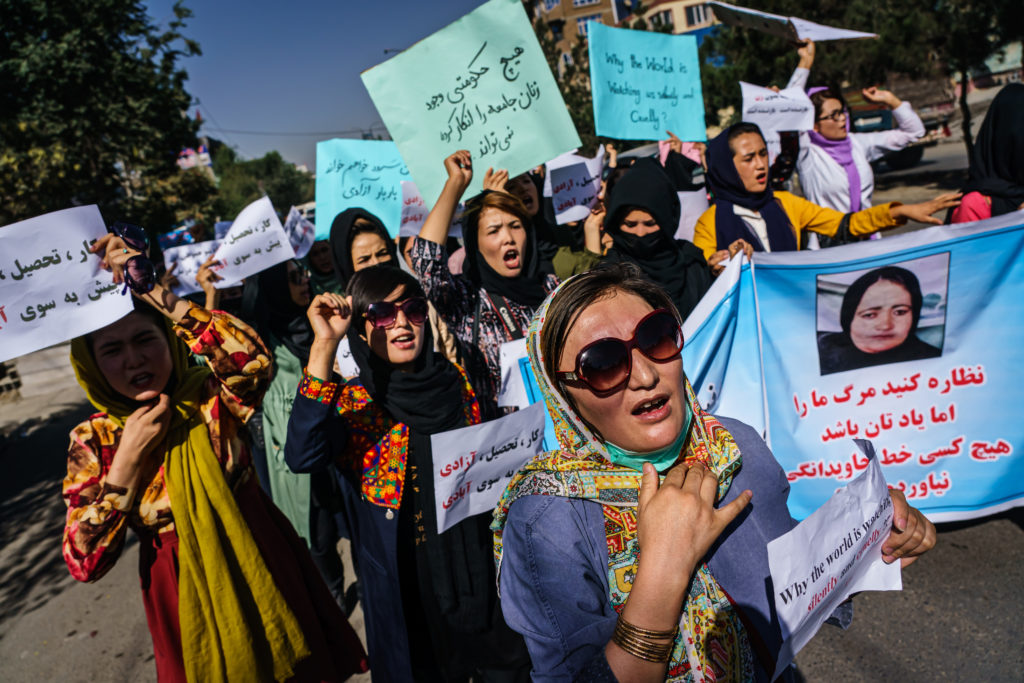
But, you say, some educated women obviously stayed; we can see pictures of them demonstrating and joining in marches.
Let’s take a closer look. The activists’ debut took place in front of the Presidential Palace, eight women holding up signs demanding their rights, followed by slightly larger groups on subsequent days representing the same message before various public buildings. The photos show them angrily yelling and raising determined fists.
Will their demands be met? Am I confident that the Taliban intend to create an atmosphere of respect and safety for women? Not at all.
But let’s not fool ourselves. For most of that country’s women, an Islamic system would represent a step up, because the worst problems they confront come not from religion but from tribal traditions. Islam does not allow forced marriage and does not require women to cover anything more than what modesty demands; it does not ban them from public spaces, and it energetically prohibits Afghan customs such as settling disputes by giving a girl to the enemy clan as a slave.
The real worry is that the Taliban, not exactly a group of sophisticated theologians, will interpret their religion in the same eccentric way as last time. Last time they forbade the keeping of songbirds, which I promise you is a rule found nowhere in the Quran. Any outside help now can best come from other, more advanced Muslim societies and their religious scholars, and from educated women across the Islamic world who have dealt with, and surmounted, comparable challenges. Even last time around, though, they seemed to have some scraps of pity for women. It was a well-known embarrassment during the years of the Western-backed government that a Taliban court in one of the areas under their control would affirm a widow’s ownership of her land, while a government court was likely to accept a bribe from her greedy neighbour.
Afghan Woman Type Four: Madrassa Teacher’s Pet
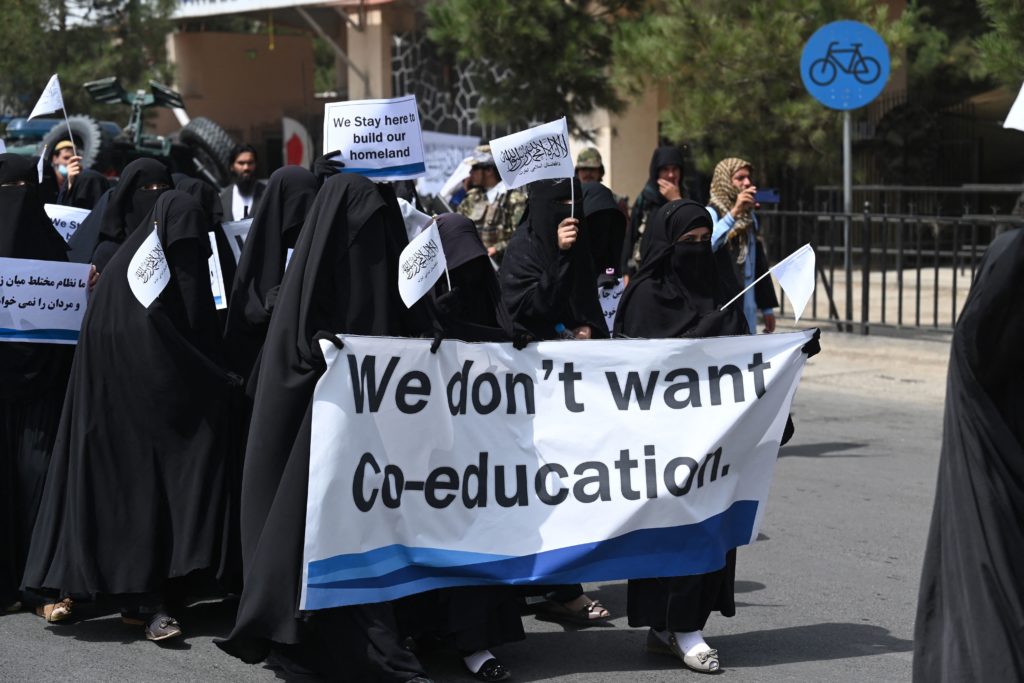
The Taliban, goaded, had a response to “our” women’s demonstrations. They bused in hundreds of Taliban-supporting, slogan-shouting women in the most extreme form of all-black full-cover dress — the kind that Iranian feminist poets used to say made women look like crows — to march through the streets of Kabul and other cities in support of strict Islamic rule.
These women didn’t suddenly materialise out of the ether. They were educated in madrassas right under our noses, and in significant numbers, during the supposed years of enlightenment and freedom during the secular era we were so proud of. Yet we had no idea they were there.
This pitting of one set of women against another is a very unfortunate development, and it’s entirely our fault. “We don’t need women who left Afghanistan telling us what to do,” their banners read. A fair point.
I’m truly not sure where we go from here. Our twenty-year liberation experiment failed, to the tune of dizzying amounts of dollars. We invested in exotic frivolities and threw money at those who needed it least, and who have since proved all too ready to bite the hand that wrote the cheques. And so — as heartless as it sounds — it is probably best if we resist the “last temptation” and stay well away. And hope that one fine day, in her own time, in her own ecosystem, the nightingale will sing.





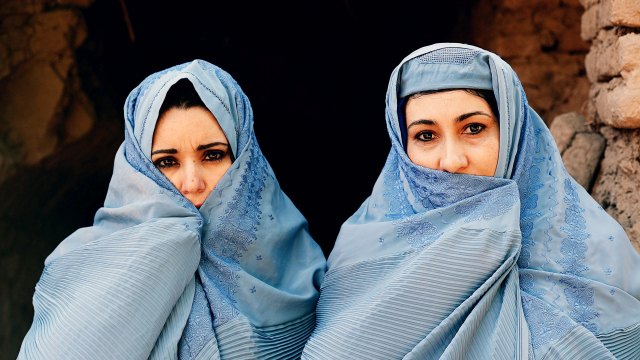



Join the discussion
Join like minded readers that support our journalism by becoming a paid subscriber
To join the discussion in the comments, become a paid subscriber.
Join like minded readers that support our journalism, read unlimited articles and enjoy other subscriber-only benefits.
Subscribe